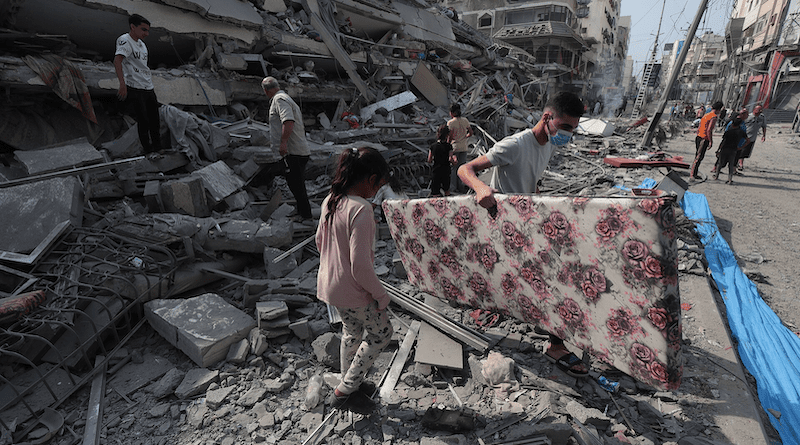The Forgotten Stories Of Gaza: Why They Deserve To Be The People Of The Year 2023 – OpEd
The Israeli military has perpetrated a massacre of more than 21,000 Palestinians in Gaza since October 7, including at least 8,663 children. According to Healthcare Workers Watch – Palestine, an independent monitoring initiative co-founded by Texas doctor Osaid Alser, reports that the Israelis have killed no less than 340 healthcare workers between October 7 and December 19, comprising 118 doctors and 104 nurses.
One of the victims was 36-year-old nephrologist Dr Hammam Alloh, who died with his father in a November Israeli airstrike on their house. Dr Alloh, a father of two young children, had previously explained in an October interview with Democracy Now! why he refused to leave Al-Shifa hospital in Gaza City and comply with the Israeli evacuation orders: “You think I went to medical school and for my postgraduate degrees for a total of 14 years so [as to] think only about my life and not my patients?”
Dr Alloh exemplified the relentless altruism of Palestinian medics, who have faced the Israeli attempt to annihilate humanity by indiscriminately bombing civilians and targeting hospitals and ambulances. A group of Israeli doctors have actively supported the assault on medical infrastructure and personnel by endorsing the bombing of Palestinian hospitals.
Palestinian medics have not only been treated as military targets, but also suffered from severe shortages of fuel, medicines, and basic supplies – shortages that were already dire in the normal situation. Witnessing the death of their relatives and colleagues has become a routine part of their work, and the Israeli army has also abducted and tortured Palestinian healthcare workers.
British-Palestinian surgeon Dr Ghassan Abu Sittah, who has volunteered with medical teams in Gaza during several Israeli attacks over the years and who spent 43 days in the besieged territory this time, told the Washington Post that he had to accept the possibility that he would not survive. One of his patients was a young girl, the only surviving daughter of a female obstetrician at Al-Shifa hospital who was killed with her other children in an Israeli missile strike. Abu Sittah remembered the girl: “Half of her face was missing. Half her nose, her eyelids had been ripped from the bone.”
Abu Sittah also witnessed remarkable “acts of love” and resistance, such as a three-year-old boy who had lost his family and whose arm and leg Abu Sittah had to amputate: “When I went to check up on him, the woman whose son was wounded in the bed next to him had him on her lap and was feeding him and her son.”
In this war, the doctors in Gaza are not the only heroes.
Palestinian journalists have also endured the deadly Israeli fire for documenting the horrific violence in the Gaza Strip. The Committee to Protect Journalists (CPJ), based in New York, states that this war has been the “deadliest period for journalists since CPJ began gathering data in 1992”; between October 7 and December 23, sixty-nine journalists and media workers had been verified dead. Of these casualties, 62 were Palestinian, four were Israeli, and three were Lebanese.
Palestinian journalist Ayat Khadura was killed in an Israeli airstrike on her home in northern Gaza on November 20 – only two weeks after she had shared a “last message to the world” in which she said: “We had big dreams but our dream now is to be killed in one piece so they know who we are.”
The year 2023 witnessed the tragic deaths of several Palestinian journalists who were targeted by Israeli airstrikes in Gaza. Among them were Ayat Khadura, who had posted a poignant message on social media before her demise on November 20; Mohamed Abu Hassira, who perished along with 42 of his relatives on November 7; and Samer Abudaqa, who succumbed to his wounds after being denied medical assistance for hours on December 15. Their colleague Wael Dahdouh, who survived multiple attacks that claimed the lives of his family members, continued to report from the besieged territory despite the immense grief and danger.
These journalists exemplified courage, resilience, and dedication to their profession and their people. They risked and sacrificed their lives to expose the atrocities and injustices inflicted by the Israeli occupation. Their stories, however, were largely ignored or marginalized by the mainstream Western media, which often displayed bias and complicity in favor of Israel.
In contrast, Time magazine chose to celebrate Taylor Swift, an American celebrity and billionaire, as its “Person of the Year” for 2023. According to Time, Swift was the “main character of the world”, a dubious claim that reflected the magazine’s obsession with pop culture and triviality. Previous recipients of this award included notorious figures such as Adolf Hitler, Donald Trump, the Joe Biden-Kamala Harris duo, and Elon Musk, whose wealth and influence were disproportionate to their moral and social contributions.
This selection revealed the disconnect and indifference of Time magazine and its readership to the plight and struggles of the oppressed and marginalized people around the world. It also demonstrated the need for alternative and independent media outlets that can challenge the dominant narratives and amplify the voices of the silenced and forgotten. As the year 2023 ended with no resolution to the ongoing genocide in Gaza, it was more appropriate and meaningful to honor the people of Gaza as the “People of the Year”.

